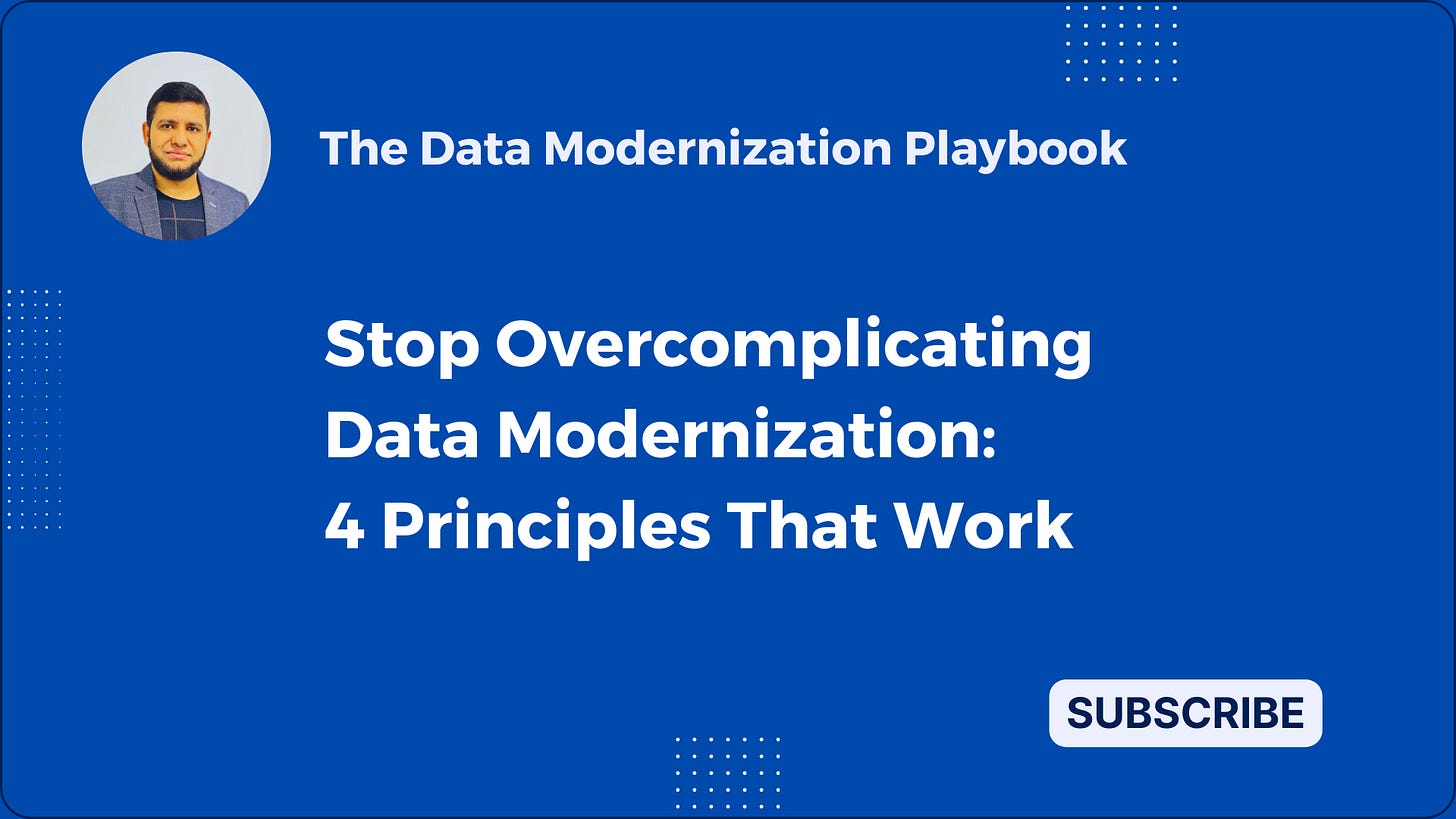#010 - Stop Overcomplicating Data Modernization: 4 Principles That Work
The straightforward approach to building future-ready data systems without unnecessary complexity...
Hi, future-ready data leaders; Khurram here 👋
Most organizations are still building yesterday's data architecture while tomorrow's business demands rapidly evolve.
A recent Bloomberg article points out, "No matter what the future brings, data-driven decision-making will remain the lifeblood of tomorrow's business" - yet most mid-sized companies are implementing modernization approaches that create more problems than they solve, with unnecessary complexity and specialized requirements that strain both budgets and teams.
Today, I'm breaking down four essential principles for data modernization that actually prepare you for future business demands:
Why simpler data architectures deliver more business value than complex ones
How to avoid expensive modernization missteps with "trendy" technologies
The multi-persona approach that ensures your data actually gets used
Building future readiness through quality, security, and governance fundamentals
Let's focus on practical modernization steps that deliver real business value.
4 Principles for Future-Ready Data Modernization
1. Simplicity Beats Complexity
The most successful data modernization projects prioritize clarity and usability over technical sophistication.
What to prioritize:
Clean, understandable data flows with minimal transformation steps
Standard interfaces between systems that reduce integration headaches
Technologies your current team can quickly master
Consolidated platforms rather than specialized point solutions
Practical steps:
Map your current data architecture to identify unnecessary complexity
Eliminate transformation steps that don't add clear business value
Standardize data integration patterns across your organization
Choose platforms that solve multiple problems rather than single-purpose tools
2. Avoid Modernization for Modernization's Sake
Not every trending data technology delivers practical business value.
What to watch for:
Solutions that require rare, expensive skills your team doesn't have
Technologies that don't solve actual business problems you face today
Platforms that create integration nightmares with your existing systems
Tools designed for tech giants, not mid-market companies like yours
Practical steps:
Create a decision framework that starts with business needs, not tech trends
Run small proof-of-concepts before making major platform decisions
Talk to reference customers of similar size about their real-world challenges
Calculate the total cost, including training, maintenance, and integration
3. Design for Multiple User Personas
Your modernized data platform must serve business users, not just technical specialists.
What to deliver:
Self-service capabilities that don't require coding skills
Data catalogs that make information discoverable and understandable
Visual interfaces alongside more technical access methods
Clear documentation written in business language
Practical steps:
Identify all the different user groups who need access to your data
Document the specific needs and technical comfort level of each group
Implement role-appropriate tools and interfaces for each user type
Create training materials tailored to each persona
4. Build Future-Readiness Through Fundamentals
Modern data demands require rock-solid foundations in quality, security, and governance.
What to implement:
Automated data quality monitoring and alerting
Clear data ownership with defined responsibilities
Consistent security controls across all data assets
Governance that enables rather than blocks innovation
Practical steps:
Define data quality standards for your most critical data domains
Implement quality checks directly in your data pipelines
Establish transparent processes for addressing quality issues
Design security and governance into your architecture from the start
Key Takeaways and Next Steps
Here's what you can do this week:
Map one core data flow in your organization to identify unnecessary complexity
Document the different user personas who need access to your data
Select one data quality issue that's limiting business value today
Remember - as Bloomberg notes, "No one-size-fits-all technology can help businesses understand customer needs, drive efficiencies, and find the competitive edge their organizations need." The most successful data modernization efforts focus on delivering business value through simplicity, accessibility, and quality fundamentals.
PS...If you're enjoying The Data Modernization Playbook, forward this to a colleague planning a data migration or modernization project. Sometimes, the most straightforward approach delivers the most value.
That's it for this week. If you found this helpful, leave a comment to let me know ✊
See you next Tuesday!


